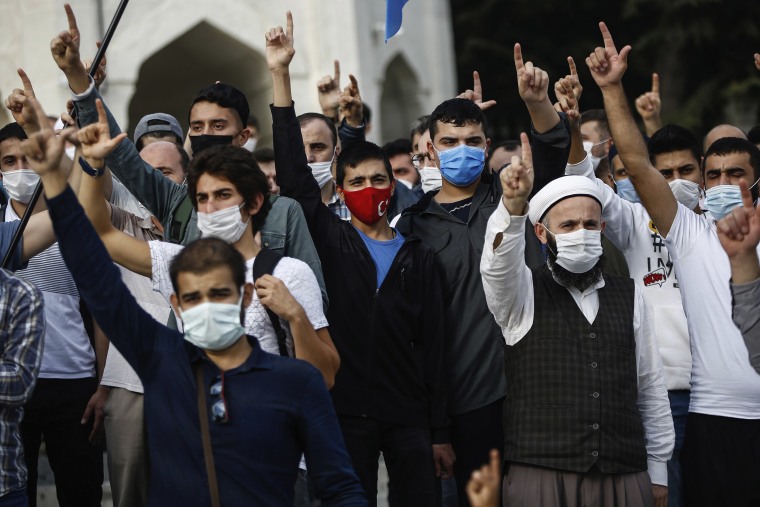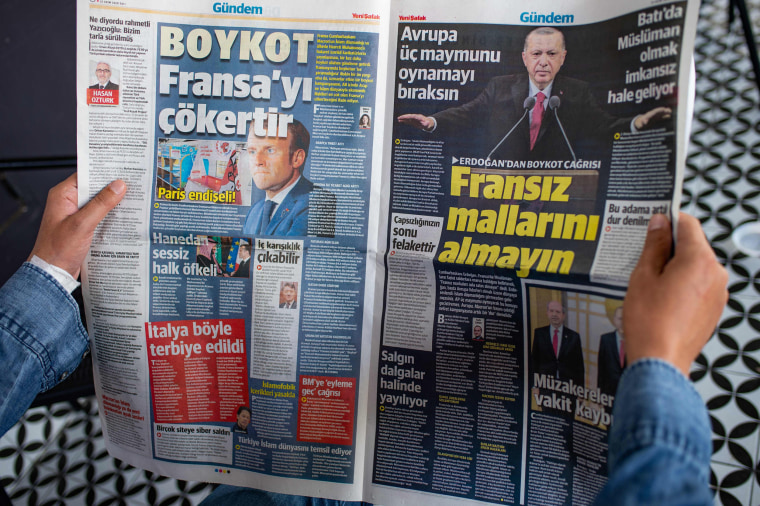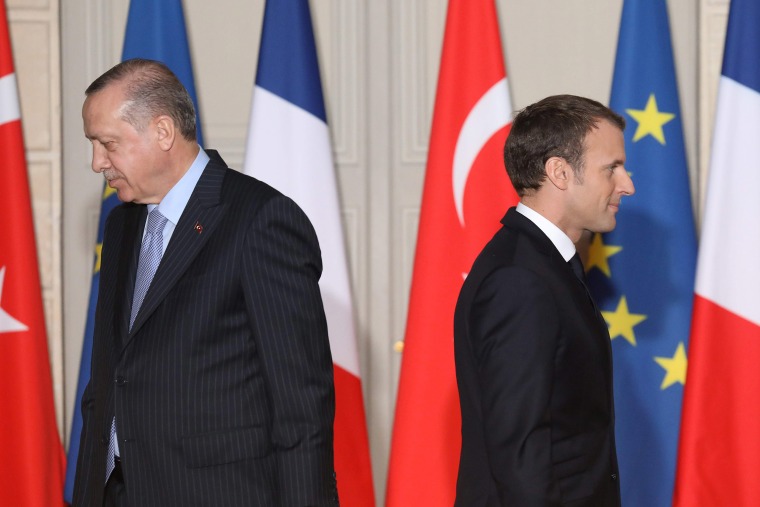PARIS — The cartoon aimed to provoke — and it worked.
A front-page illustration published by the French satirical weekly Charlie Hebdo on Wednesday showing Turkish President Recep Tayyip Erdogan lounging in his underwear, pulling up the skirt of a woman wearing a hijab to reveal her bottom, has escalated an already hostile war of words between him and French President Emmanuel Macron.
“Macron is against Muslims. He is sowing seeds of hatred,” Erdogan said Wednesday. “Turkey will take necessary legal, diplomatic actions against ‘loathsome’ Charlie Hebdo publication.”
Charlie Hebdo’s repeated publications of images mocking the Prophet Muhammad have made it the target of violent terror attacks and inspired global controversy in the past.
Some 24 hours after the cartoon emerged, a suspected terrorist attack on the Notre Dame basilica in Nice on Thursday killed three people and left others injured. At the same time a security guard at the French consulate in the Saudi city of Jeddah was also the victim of a knife attack. The suspect in each attack have not been confirmed, nor their motive.
Turkey's Foreign Ministry condemned the Nice attack in a statement and offered condolences the victims' families.
But the caricature of Erdogan and his angry reaction have fueled a worsening dispute between the two leaders that is as much personal as it is political, with both men stylizing themselves as selfless champions of persecuted traditions and worldviews who are prepared to make rhetorical combat on the world stage.

The latest spat comes after a dispute between Erdogan and Macron spilled over into the streets, with protesters in Turkey, Syria, Iraq, Pakistan, Bangladesh and the Palestinian territories demanding that France condemn caricatures of the prophet.
Several governments in the Muslim world have already encouraged or imposed boycotts on French products, such as L’Oreal hair products and La Vache Qui Rit cheese triangles. On Tuesday, France’s foreign ministry warned its citizens living in Muslim-majority countries to take precautions and avoid public gatherings.
So, though protests against images of the prophet — whose depiction is forbidden in Islam — are not new, this week’s flare-up owes much of its strength to Erdogan, who has led the charge against Macron.
The conflict between Erdogan and Macron remains as much a clash of personalities and ambitions as a clash of civilizations, according to Sinan Ulgen, an expert in Turkish foreign policy and a visiting scholar at Carnegie Europe, a political think tank.
“Given that we are indeed witnessing an escalation and that this can have no real positive outcome from the perspective of international relations, both of them are moved rather by calculations that relate to their domestic political concerns,” he said.
“The domestic political calculations come into play when they choose these confrontational theatrics,” he added.
Neither leader is motivated entirely by nakedly political considerations, Ulgen said, they likely believe the urgency of their respective missions.
But both men are also taking opportunities to fill geopolitical gaps on the world stage.
For Macron’s part, he has sought to present himself as the standard-bearer of Western liberalism as the United States has retreated from the Middle East and international institutions under President Donald Trump.
Download the NBC News app for breaking news and politics
Meanwhile, as Arab countries show a willingness to crush their own domestic Islamist movements and recognize their historical enemy Israel, Erdogan has wrapped himself in the banner of Palestinian liberation and a persecuted, global Muslim identity.
“This narrative has captured the imagination of the Turkish population,” said Ulgen, who called Erdogan’s political project “make Turkey great again.”
“They see Turkey as having espoused a much bigger regional role in years past. And they like it.”
The conflict really began early this month, when Macron introduced legislation meant to strengthen French secularism against what he called Islamist “separatism.” Erdogan took particular exception to Macron’s description of Islam as a religion “in crisis.”

Macron’s theoretical talking points took on a more urgent meaning two weeks later, when an 18-year-old Chechen refugee decapitated a school teacher for showing his students the controversial Charlie Hebdo caricatures of the prophet during a civics class or debate on freedom of expression.
During the ensuing outrage and mourning over the slain teacher, Macron specifically refused to condemn the caricatures’ publication and supported a broad investigation into extremist French Muslims.
France has the largest Muslim population in Europe, according to Pew Research Center, with Muslims making up nearly 10 percent of France’s population. But the country also prizes secularism and many French people have resisted immigration and the integration of minority groups.
After Erdogan implied last week that Macron might be insane, France withdrew its ambassador to Ankara, setting off a diplomatic firestorm that has seen European leaders rally behind Macron in the face of criticism from the Muslim world.
The stakes, and therefore the need to play political brinksmanship, are higher for Erdogan, analysts say. Erdogan has spent much of the past several years orchestrating military interventions in Syria, Iraq and Libya while exerting diplomatic influence over conflicts in Nagorno-Karabakh and the eastern Mediterranean Sea.
All this while navigating an economic downturn and maintaining his 17-year-long grip on power.
With challenges like those, having external enemies can be politically useful, Bruno Tertrais, deputy director of the Foundation for Strategic Research in Paris, said.
“It would be a mistake to establish a symmetry between the two: Erdogan has been personally insulting Macron for a year now -- the reverse is not true,” Tertrais said in an email. “Erdogan is clearly surfing on a populist-nationalist wave, using Macron as a punching” bag.
Indeed, by most political metrics, Macron is in a more secure position than his Turkish counterpart. Unlike Erdogan, Macron’s gambit is more about ambition than political survival.

Still, the wellspring of outrage in the Middle East could complicate Macron’s pet diplomatic projects that are essential to his self-image: A government-building effort in Lebanon, negotiations to end Libya’s civil war, stubborn Islamist insurgencies in the African Sahel, and a show of force against increasing Turkish militarization in the eastern Mediterranean.
The worst threats to Macron come from a right-wing opposition, which has repeatedly come within striking distance of taking the Elysée Palace.
A statement Monday from the National Rally, the party of right-wing populist Marine Le Pen, dripped with derision for both Erdogan and Macron. Jordan Bardella, the party’s vice president and a European parliamentarian, called Erdogan an “Islamist Sultan” whose “provocations and aggressions” shouldn’t be accepted with mere “moral condemnation and naïve calls for discussion.”
Both men will soon face re-election — Macron in 2022 and Erdogan in 2023. Those contests will help answer whether diplomatic swagger plays as well at home as it does abroad.

